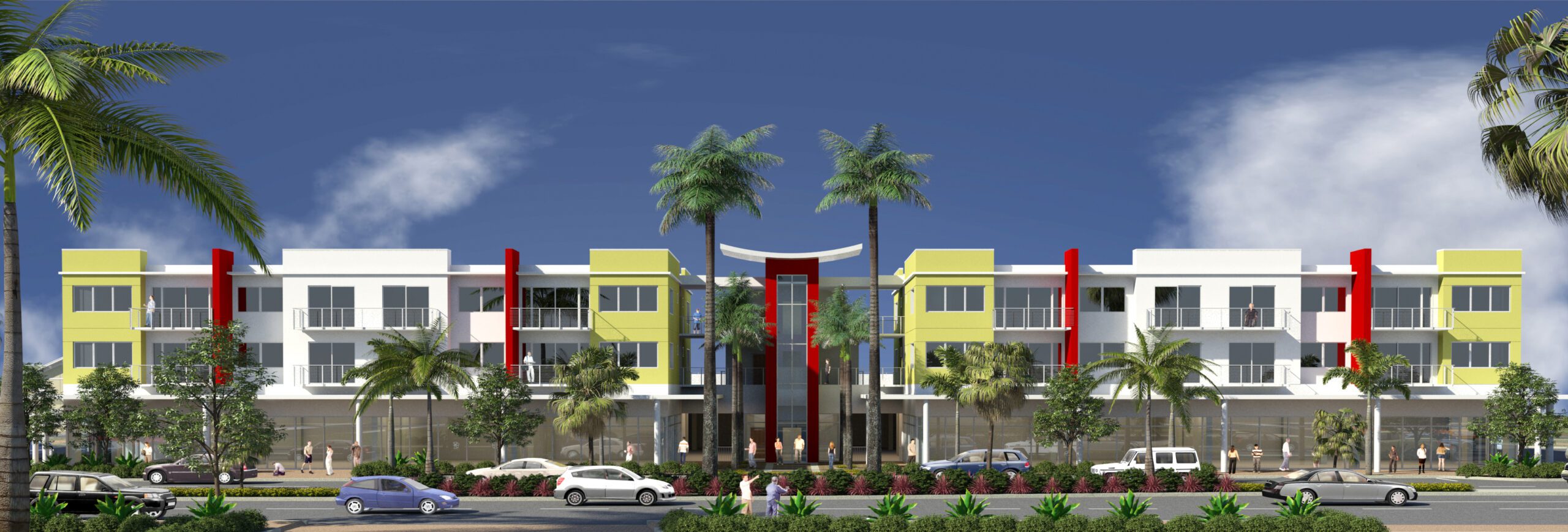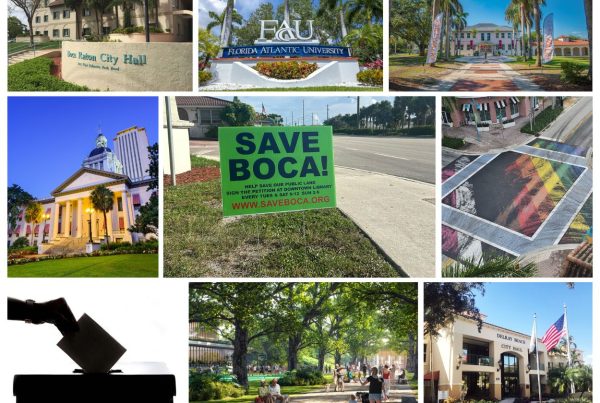 Uptown Atlantic
Uptown Atlantic
This could be the make-or-break week for Uptown Atlantic. Or not.
On Nov. 23, with closing on the property a week away, the Delray Beach Community Redevelopment Agency notified the developer that the project was in default for not providing a letter of credit or a performance bond. Closing did not happen, but Equity Delray principal John Flynn met last week with the CRA. Director Jeff Costello called it “a good meeting,” but he would not discuss details.
After that meeting, Equity Delray submitted a request to extend the closing date. That request is on the agenda for Thursday’s regular CRA meeting. The CRA board could grant the extension, amend the purchase agreement for the 6-acre site or terminate the agreement if board members don’t receive sufficient assurances from Flynn.
Equity Delray could argue that an extension for this purchase agreement is no different than the extensions the CRA granted for the iPic project. Closing for that deal is set for Jan. 31. The CRA, though, could argue that iPic’s delays stemmed from negotiations over agreements covering the parking garage and other issues; there never has been doubt about iPic’s financing.
Obviously, terminating the Uptown Atlantic agreement could result in a lawsuit. From what I’ve heard, Flynn has told the CRA that he has spent $5 million on the project. I tried to speak with Flynn on Monday, but a voicemail was not returned.
Before the CRA’s regular meeting is a workshop with the West Atlantic Redevelopment Coalition. One topic will be the coalition’s accomplishments. The hope surely had been to tout the closing for Uptown Atlantic as an accomplishment. The project has been the coalition’s priority, and there was much celebrating when Uptown Atlantic passed its final city commission review last spring.
20th Street visioning session
Last Friday’s “visioning session” on 20th Street between Boca Raton and Florida Atlantic University was successful, according to Mayor Susan Haynie.
Four of Boca’s five elected officials attended, along with the city’s department heads. FAU’s delegation included President John Kelly. Haynie called the three-hour session “very beneficial.”
The purpose was for the city to hear Kelly’s plan for making FAU more of a traditional college and how it could affect Boca Raton outside the campus. Ideally, that collective vision would be mutually beneficial.
Haynie said the city heard Kelly say that he wants all traditional—four-year—freshmen and sophomores to live on campus. That wish to increase dorm space is a change from previous Kelly statements that he wanted to use all remaining land on campus for academic buildings.
According to Haynie, Kelly said research shows that on-campus students get better grades. Retaining students after two years is a key metric in the new state formula that determines how much money state universities receive.
That change, though, would affect how many students might live off-campus, and where. Police Chief Dan Alexander and Fire-Rescue Chief Tom Wood presented records of service calls to University Park, the privately built student complex on 20th Street. Haynie has insisted that FAU must provide basic police services for student complexes, though the city would investigate serious crimes, like the December 2015 fatal shooting of a student at University Park.
FAU General Counsel David Kian, Haynie said, suggested that student housing complexes could be part of FAU even if they were separate from the campus. If true, that could resolve some of the city’s concerns.
Crafting a student-centric plan for 20th Street has been a council goal for three years. The timing of Friday’s meeting was especially good. FAU’s campus development agreement is expiring and will need to be renewed. Among other things, FAU would like to see a hotel/conference center on Glades Road near Boca Raton Regional Hospital. FAU also faces a federal lawsuit alleging that the city illegally approved student housing that excludes students who have children. A developer wants to build a project northeast of FAU that could house 640 students.
The Treasure Coast Regional Planning Council, which moderated Friday’s meeting, will summarize the comments in a report to the council. Haynie said the likely next step will be a full charrette—a communitywide event. That would cost $250,000. Haynie said the Palm Beach Metropolitan Organization probably would pay a share, and she wants FAU also to contribute.
“I’m thrilled,” Haynie said, “that we’re moving this forward.”
Sales tax
Despite what amounted to a fake-news campaign by BocaWatch against the countywide one-cent sales tax increase, Boca Raton voters approved the $2.7 billion plan by almost the same margin as all voters. Just as noteworthy, support was widespread.
Of Boca Raton’s 50 precincts, only four voted against the tax—and the combined margin was just 80 votes. Citywide, the tax got 56.7 percent, compared to 56.6 percent countywide. There also was very little drop-off in the number of voters who made a choice in the presidential race and made it much farther down the ballot to the tax.
Calusa may benefit
One immediate benefit to Boca Raton from the sales tax could be a more appealing solution to overcrowding at Calusa Elementary School.
Calusa, in northwest Boca, is the county’s most overcrowded elementary school. Last week, the school district held a meeting at Spanish River High School to hear from the community on new boundaries that would affect Calusa and other elementary schools in the city, notably J.C. Mitchell and Addison Mizner. Those within the current Calusa boundary want to stay there.
Jason Link is the school district’s manager of demographics and boundaries. In an interview, he cited several factors that have contributed to growth at Calusa: new residential development, houses turning over from older couples to younger families, students leaving private schools and the closing of the gifted program at Banyan Creek Elementary.
The change has been swift. Just three years ago, Calusa had 847 students—roughly capacity—and had added only one student from the previous year. The population increased by about 230 the next two years, and rose again this year to roughly 1,200.
Under the current plan, nearly 400 students from almost two dozen neighborhoods would attend different schools. Shifting some to J.C. Mitchell, for example, would shift Mitchell students to Addison Mizner. With the tax, though, the district has “many options,” Link said.
One could be enlarging Calusa, though such a project is not in the current construction plan. Verde Elementary, which is nearly as overcrowded, would get a near-rebuild under the plan. So would Addison Mizner, which the district could enlarge.
The next meeting on Calusa is scheduled for Dec. 13. Superintendent Robert Avossa would recommend any boundary change to the school board. A decision may not come until spring. The city council, which took no vote on the sales tax—Scott Singer wanted the council to take a position against it—wants Boca Raton students to stay at Boca Raton schools. Approval of the sales tax could make that more likely.
Delray and the sales tax
Unlike the Boca council, the Delray Beach City Commission voted to support the sales tax. Tonight, the commission will discuss whether to create its own oversight committee to monitor the city’s spending of sales tax revenue or be part of the Palm Beach County League of Cities’ oversight committee.
As a memo from City Manager Don Cooper explains, the committee would have to last the duration of the sales tax—10 years or when revenue reaches $2.7 billion, whichever comes first. The commission would determine the size of the committee and the eligibility requirements. As with the league’s committee, a city version would have to follow the state’s open-meetings and open-records laws.
Estimates are that Delray Beach could receive between $37.7 million and $44.5 million from the tax. Of the city creating its own oversight, Mayor Cary Glickstein said, “The theory has merit, but the goal of equitable and transparent distribution relies on who comprises the committee and how capable they are of remaining fair and objective against a tidal wave of voices seeking funds for many worthy projects.”
Jacquet’s replacement deadlock to be tried again
The Delray Beach City Commission will try again tonight to appoint a replacement for Al Jacquet, whose term expires in March. On its first attempt, the commission deadlocked: Mayor Cary Glickstein and Commissioner Jordana Jarjura for Yvonne Odom, commissioners Mitch Katz and Shelly Petrolia for Josh Smith.
If no one shifts, strict application of the charter requires the commission to hold a special election. City Attorney Max Lohman, however, suggested that failure to do so for such a short tenure and at cost to the city might not be a big deal.
The impression at the last meeting also was that the commission could not go back on a second attempt to any of the other eight applicants. Yet the backup material includes the list of applicants. Just to make things interesting, qualifying for the regular March election begins on Jan. 31 and runs through Feb. 14.
Old School Square lease
Though a new lease between Delray Beach and Old School Square had been on tonight’s city commission agenda, it has been delayed until next week. City Manager Don Cooper, though, told me Monday that lawyers on both sides have agreed on the lease, and it will be on the agenda for next Tuesday’s meeting—the final one for 2016.
Boca Raton Bowl
The third Boca Raton Bowl will match Western Kentucky and Memphis. ESPN will broadcast the network-produced game at 7 p.m. on Dec. 20 from Florida Atlantic University stadium. After last year’s downpour, ESPN will be hoping for better weather, not just a good game.








I’m all for the 20th Street project. I’m all for charrettes, and have attended several. But $250,000? For what?
Location Location Location